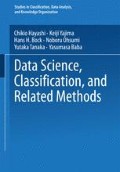Summary
Partial least squares linear discriminant function (PLSD) is a new discriminant function proposed by Kim and Tanaka (1995a). PLSD uses the idea of partial least squares (PLS) method, which was originally developed in multiple regression analysis, in discriminant analysis. In this paper, two types of PLSD are investigated and evaluated in a simulation study. In the first type named PLSDA(all), a common pooled within-group covariance matrix of all groups is used in modeling PLSD to discriminate all pairs of groups. In the second type named PLSDT(two), pooled within-group covariance matrices based on the related two groups are used in modeling PLSD to discriminate pairs of groups. As the results of the simulation study PLSDA has the better performance than PLSDT in all situations when the covariance matrices are equal in all groups, while PLSDT is better than PLSDA in well conditioned situations when the covariance matrices are different among the groups.
Access this chapter
Tax calculation will be finalised at checkout
Purchases are for personal use only
Preview
Unable to display preview. Download preview PDF.
References
Efron, B., and Morris, C. (1976), Multivariate Empirical Bayes and Estimation of Covariance Matrices, The Annals of Statistics, Vol. 4, pp. 22–32.
Flury, B., Schmid, M. J. and Narayanan, A. (1994), Error Rates in Quadratic Discrimination with Constraints on the Covariance Matrices, Journal of Classification, Vol. 11, pp. 101–120.
Frank, I. E. and Friedman, J. H. (1993), A Statistical View of Some Chemometrics Regression Tools, Technometrics, Vol. 35, No. 2, pp. 109–148.
Friedman, J. H. (1989), Regularized Discriminant Analysis, Journal of the American Statistical Association, Vol. 84, pp. 165–175.
James, W., and Stein, C. (1961), Estimation with Quadratic Loss, Proceedings of the Fourth Berkeley Symposium on Mathematical Statistics and Probability, Vol. 1, pp. 361–379, Berkeley: University of California Press.
Kim, H. B., and Tanaka, Y. (1994), A Numerical Study of Partial Least Squares Regression with an Emphasis on the Comparison with Principal Component Regression, Proceedings of the Eighth Japan and Korea Joint Conference of Statistics, pp. 83–88, Okayama, Japan.
Kirn, H. B., and Tanaka, Y. (1995a), Linear Discriminant Function Using Partial Least Squares Method, Proceedings of International Conference on Statistical Methods and Statistical Computing for Quality and Productivity Improvement (ICSQP ‘85), Vol. 2, pp. 875881, Seoul, Korea.
Kim, H. B., and Tanaka, Y. (1995b), Generating Artificial Data with Preassigned Degree of Multicollinearity by Using Singular Value Decomposition, The Journal of Japanese Society of Computational Statistics, Vol. 8., pp. 1–8.
Kim, H. B., and Tanaka, Y. (1996), Application of Partial Least Squares Linear Discriminant Function to Writer Identification in Pattern Recognition, Journal of the Faculty of Environmental Science and Technology Okayama University, Vol. 1. pp. 65–76.
O’Sullivan, F. (1986), A Statistical Perspective on Ill-Posed Inverse Problems, Statistical Science, Vol. 1, pp. 502–527.
Rao, C. R. (1973), Linear Statistical Inference and Its Applications, 2nd Edition, John Wiley and Sons, Inc., New York.
Stigler, S. M. (1990), The 1988 Neyman Memorial Lecture: A Galtonian Perspective on Shrinkage Estimators, Statistical Science, Vol. 5, pp. 147–155.
Titterington, D. M. (1985), Common Structure of Smoothing Techniques in Statistics, International Statistical Review, Vol. 53, pp. 141–170.
Wold, H. (1975), Soft Modeling by Latent Variables; the Non-linear Iterative Partial Least Squares Approach, In Perspectives in Probability and Statistics, Papers in Honou of M. S. Bartlett, Edited J. Gani, Academic Press, Inc., London.
Wold, S., \Vold, H., Dunn, W. J., and Ruhe, A. (1984), The Collinearity Problem in Linear Regression. The Partial Least Squares (PLS) Approach to Generalized Inverse, SIAM Journal on Scientific and Statistical Computing, Vol. 5, pp. 735–743.
Yoshimura, M., Yoshimura, I. and Kim, H. B. (1993), A Text-Independent Off-Line Writer Identification Method for Japanese and Korean Sentences, IEICE Trans. Inf. and Syst., Vol. E76-D, No 4, pp. 454–461.
Author information
Authors and Affiliations
Editor information
Editors and Affiliations
Rights and permissions
Copyright information
© 1998 Springer Japan
About this paper
Cite this paper
Kim, H.B., Tanaka, Y. (1998). Two Types of Partial Least Squares Method in Linear Discriminant Analysis. In: Hayashi, C., Yajima, K., Bock, HH., Ohsumi, N., Tanaka, Y., Baba, Y. (eds) Data Science, Classification, and Related Methods. Studies in Classification, Data Analysis, and Knowledge Organization. Springer, Tokyo. https://doi.org/10.1007/978-4-431-65950-1_28
Download citation
DOI: https://doi.org/10.1007/978-4-431-65950-1_28
Publisher Name: Springer, Tokyo
Print ISBN: 978-4-431-70208-5
Online ISBN: 978-4-431-65950-1
eBook Packages: Springer Book Archive

